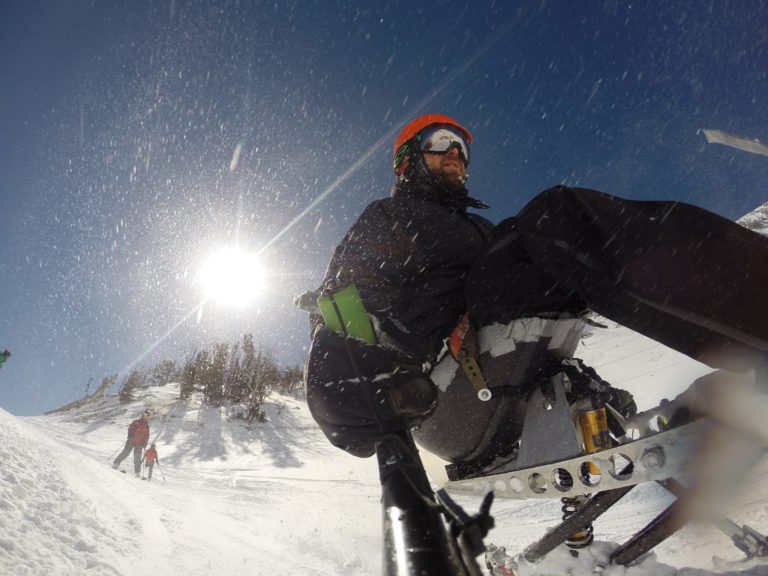 CURE NATION: If you dream of hitting the slopes as an adaptive skier, you’ll love the perspective shared below by West Coast skier David “Madman” Poole and East Coast skier Chris Collin.
CURE NATION: If you dream of hitting the slopes as an adaptive skier, you’ll love the perspective shared below by West Coast skier David “Madman” Poole and East Coast skier Chris Collin.
Both regained active lifestyles after spinal cord injury by embracing the slopes on a mono-ski, and below they share tips and tricks for you to explore the sport too.
PEOPLE SHOWED CHRIS AND DAVE THE ROPES to get on the slopes
Chris Collin is a 33-year-old para from Hollis, Maine. At 22, he had a motorcycle accident where he hit a tree and broke his back at the T-5 level, and at some point during his hospital stay when he was figuring out how to put the pieces of his life back together, a fellow para named Jay Germain rolled in.
Jay mentors at New England Rehabilitation Hospital in Portland, ME, and came to visit Chris to talk about how important it is to stay active post-injury and share some opportunities that might be available to him when he got out. Jay also happened to be a ski instructor for Maine Handicapped Skiing, and that caught Chris’ interest.
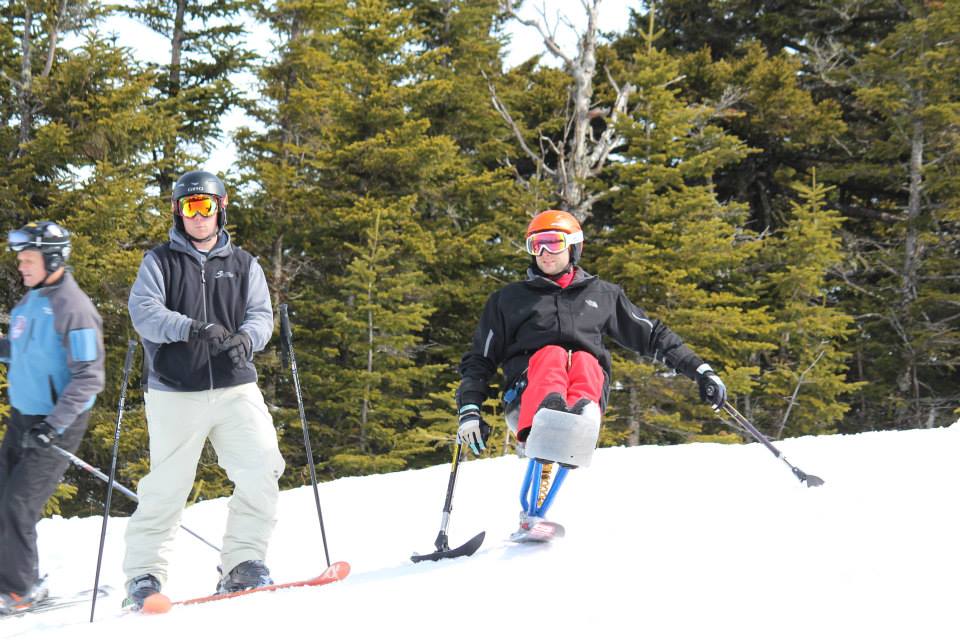
“If you want to have independence in the outdoors, then you should try monoskiing because once you’re on the snow you can do anything that anyone else can,” Chris says.
“Getting started depends on the adaptive program that you go to, but getting in the equipment and get fitted is number one. Keep an open mind and put a smile on your face is all it takes to start.”
David Poole is a self-proclaimed ski bum from Bozeman, Montana, who was injured 13 years ago when he skied of a 60-foot cliff at the Copper Ski Resort in Colorado where he worked. At the time, he owned a landscaping business in Montana where he spent the summer between ski seasons.
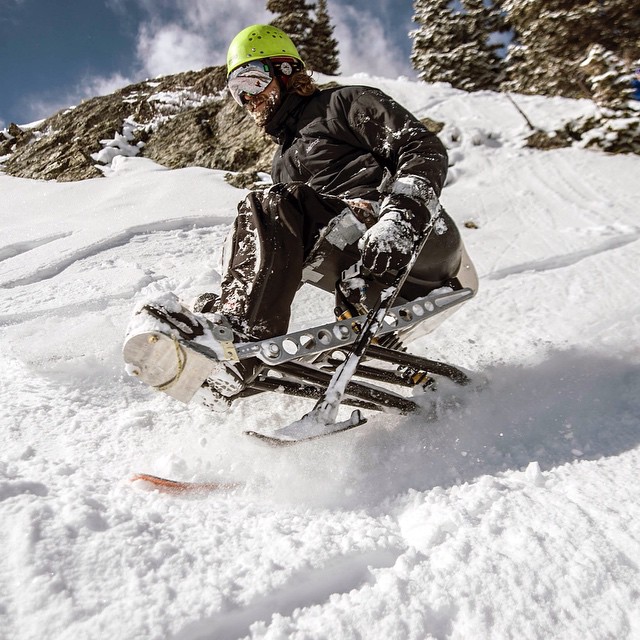
After his accident, Dave spent three months at Craig hospital in Colorado where he met a girl named Kate Kimberly. A fellow skier, she had a foundation that helped get him a monoski called a Yeti Racer, and by November of that year, he was back on the slopes.
OUTDOORS SPORTS AFTER SCI: A PERSONAL QUEST
Chris had never skied before his injury so he was new to the sport. After he was discharged from rehab, he went to Sugarloaf Mountain one day to check out the adaptive ski equipment and climb into the bucket of a monoski for the first time.
Chris made his maiden run down the slopes that same day, a trip where he was tethered and guided down with the help of instructors and volunteers. He was hooked!
“It was the closest thing I could get to the feeling of riding a motorcycle,” Chris said. “I loved the adrenaline rush.”
After that he signed up for lessons at Sunday River, ME, where Jay worked, and three years later he was skiing on his own. “It took about 20 trips before I could ski on my own, before I could get back up on my own after falling down. That’s the hardest thing to do,” he confessed.
Chris now owns a custom-fitted KBG monoski that is commonly known as the Bramble. (Editor’s note: The Bramble is made by Kevin Bramble Goodz).
Dave started out post-SCI on a Yeti monoski. The Breckenridge Outdoor Education Center in Breckenridge, CO, helped Dave get his equipment and lessons, and just like Chris, he needed help from his instructors when he was re-learning his passion — mostly to pick him back up when he fell.
“I went from being an expert skier to back to amateur. I had to learn it all again, while I was getting used to my body and balance after getting hurt. It was tricky,” David says, “But I got a bigger rush from going down your basic slope.”
DAVE AND CHRIS COMPARE TERRAIN FOR ADAPTIVE SKIERS
In 2016, Dave spent 80+ days on the mountain as an adaptive skier. He competed in the X Games on a KBG monoski and was pushing his body to the limits again. It was just like before when his life revolved around skiing.
“Out west, the terrain is different,” he details. “They say the snow is more forgiving here. Everybody says we have the best snow, the powder.”
The mountains are taller and the climate more arid out west. Those factors are what makes it different when you’re talking about western snow skiing, and since there are so many big states where skiing is popular, there are a ton of options.
“Colorado is great,” Dave says. “They say Steamboat has the champagne of powder, but I like Montana now. We have something here called ‘cold smoke’. When it’s really cold and dry you can find 40 inches of cold smoke. It’s like that perfect wave to a surfer. It’s what keeps me coming back.”
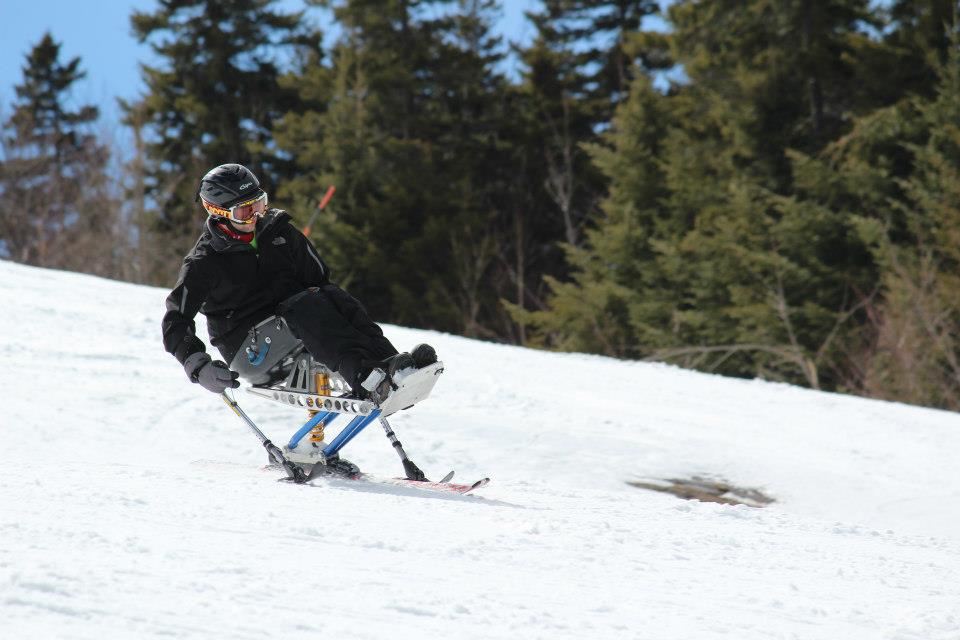
“In Maine, the snow’s different,” Chris details. “It can get harder and icier here because it’s wetter and it’ll turn to ice. We say it gets ‘corny’ sometimes when it’s getting icy. Our mountains aren’t as tall and we get a lot of lake effect snow too. That makes it trickier because you’re skiing on hard pack and it’s harder to get an edge to turn the ski. It also makes it faster.”
When Chris first started, it took a while to learn how to steer the Bramble. “It’s not leaning your body as an adaptive skier,” he says, “you steer with your head and shoulders by twisting them. It takes a lot of practice and finesse, and our snow can be tough to learn on. I’ve always wanted to go west to try the ‘steep & deep’. I’ve got some ski friends and we’re gonna make a trip out there soon.”
HOW DAVE AND CHRIS SUPPORT THEIR SKI ADVENTURES
Dave currently works as a rep for a company called Softwheel that makes innovative wheelchair wheels. He travels the country promoting the product which means he’s spending less time on the mountain these days (less than he needs to be anyway), but he finds plenty of ways to fuel his adrenal-junkie habit.
Chris works at Cabela’s in Scarborough, ME, as an outfitter. He also travels as a Cure representative at the Abilities Expo. He rides a motorcycle and stays as active as he can, still chasing the rush.
The two adaptive skiers are making plans to meet on the mountain someday, and we can’t wait to see the video! In addition to sharing their adventures, we also want to share one way that Dave and Chris stay healthy so they can hit the slopes.
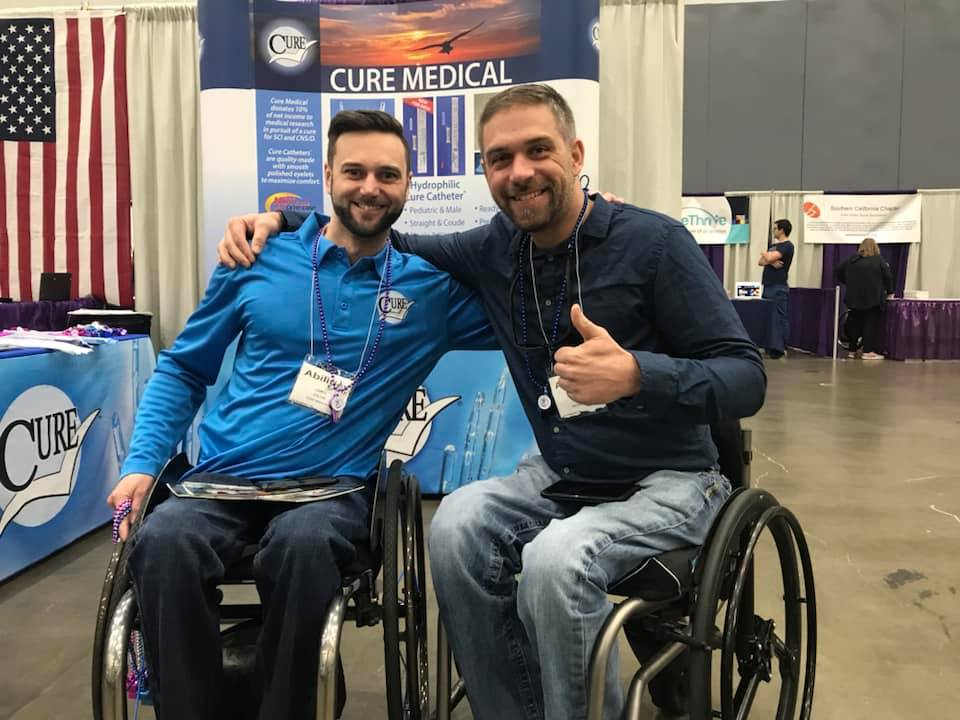
WHY DAVE AND CHRIS CHOOSE A CURE CATHETER
UTIs are no fun, especially when you are as active as Dave and Chris are. Unfortunately, UTIs are a big part of life after spinal cord injury for most folks. That’s why Dave “Madman” Poole was thrilled to share his two cents on the Cure Ultra® for Men, a ready-to-use catheter that he discovered at the Abilities Expo.
“Cure Catheters are so much superior to the competition, and taking care of myself is the best thing I can do to maintain my active lifestyle. I like the smoothness of them, and I’ve had less urinary tract infections since using them,” Dave explains.

The Cure Ultra® Coude for men is pre-lubricated, and has a bent tip along with a blue control stripe to help with comfort and accuracy during insertion.
Chris Collin agrees, as he discovered Cure Catheters® after a process of trying to find which catheter worked best for him.
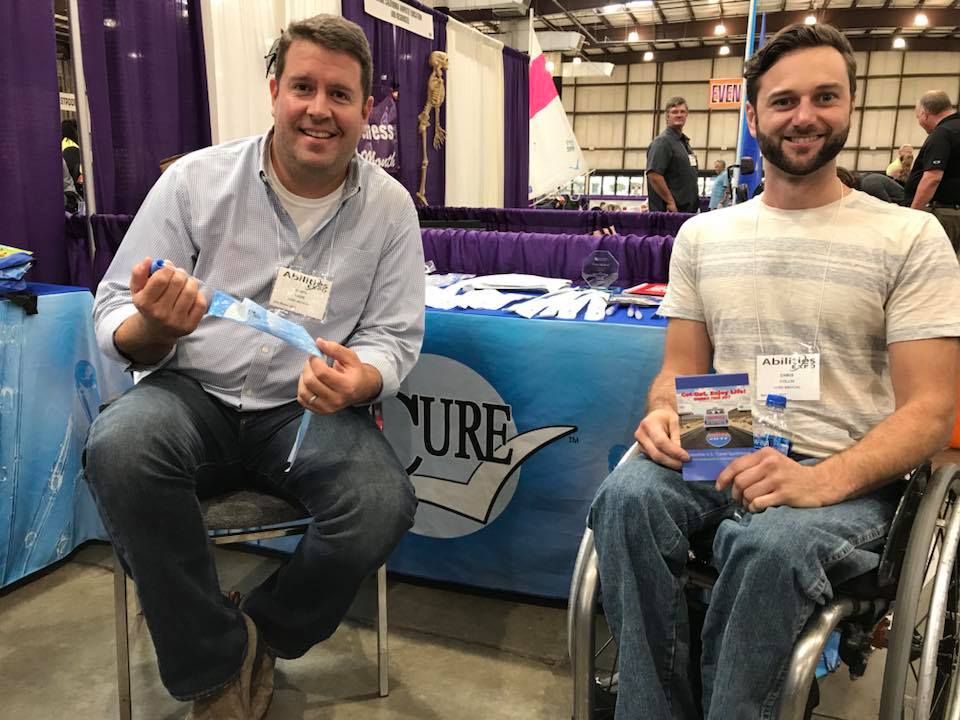
“Right after my injury, I consistently got urinary tract infections (UTIs). I tried many different brands of catheters. I always washed my hands carefully before using my catheters and tried to keep everything associated with my catheters as sterile as possible,” Chris explains.
“I started off liking the Cure Medical catheter, because it reduced the number of UTIs I had. But then, after I learned more about them, I really appreciated that the Cure catheters didn’t contain any DEHP or BPA in their catheters,” he continues.
“In several studies, DEHP and BPA had been linked to cancer. I didn’t want to put anything with DEHP or BPA in my body.”
~ Chris Collin
“I’d love to talk with any person who wants to try out a Cure Medical catheter, and I’ll be happy to share my experiences. Feel free to reach out to me!,” Chris adds.
 Try a Cure like Chris and David did! To request free samples of the Cure Ultra® Ready-to-Use Catheter for men or any Cure Medical catheter, contact your local distributor of quality healthcare products, or click here.
Try a Cure like Chris and David did! To request free samples of the Cure Ultra® Ready-to-Use Catheter for men or any Cure Medical catheter, contact your local distributor of quality healthcare products, or click here.
Learn more about the concerns with DEHP here.
Enjoy Our Free Resources & Articles
CURE NATION is designed with you in mind, to offer assistance and education when you need it through a personal support program.
All of the information you find below and on our related social media pages is meant to guide you to places, topics and resources that enhance your life, while also connecting you with a growing group of friends.
- Sign up for our free, CURE NATION e-newsletter to have our latest stories delivered directly to you, once a month.
- Get our FREE LIFESTYLE + ACCESSIBLE TRAVEL BOOKS here.
- Meet us in person at a CURE NATION event.
- Have an idea you’d like to share? Let us know.
- Be sure to take minute to meet our Cure Advocates too.
Founded by a quadriplegic, Cure Medical is the only catheter manufacturer in the world that donates the first 10% of its net income to support research programs in pursuit of a cure for urinary retention, paralysis, spinal cord injury and central nervous system disorders.

